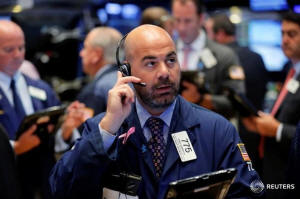|
Divided Wall St. clings
to view of one 2016 rate hike after jobs data: poll
 Send a link to a friend
Send a link to a friend
 [July 09, 2016]
NEW YORK (Reuters) - Wall Street's
top banks were almost evenly split over whether the Federal Reserve
would raise U.S. interest rates in 2016, with a poll following Friday's
strong jobs data showing a razor-thin majority expect the central bank
to raise rates once by the end of the year. [July 09, 2016]
NEW YORK (Reuters) - Wall Street's
top banks were almost evenly split over whether the Federal Reserve
would raise U.S. interest rates in 2016, with a poll following Friday's
strong jobs data showing a razor-thin majority expect the central bank
to raise rates once by the end of the year.
Eight of 15 of primary dealers, or firms that do business directly with
the Fed, said the central bank would lift its target interest rate by
0.25 percentage point by the end of the year. While the result was
little changed from the previous survey on June 15, the question on Wall
Street now was not whether the Fed could manage one or two rate hikes,
but whether it could pull off even one.
For those who thought the Fed would not raise rates this year, the key
factor was overseas risk that could hurt the U.S. economy, namely
fallout from Britain's June 23 vote to leave the European Union, known
as Brexit.
The government said on Friday U.S. employers added 287,000 workers last
month, the most since last October, improving sharply on a stunningly
meager 11,000 gain in May and handily beating a forecast 175,000
increase.
"They don't want to over-react to one set of payrolls, good or bad.
Then, you have Brexit," said Sam Bullard, senior economist at Wells
Fargo Securities in Charlotte, North Carolina.
Wells Fargo is one of the 23 primary dealers.

None of the primary dealers surveyed expected the Fed would raise its
current 0.25-0.50 percent target range on the federal funds rate at the
Fed's July and September policy meetings.
The fed funds rate is the overnight cost for banks to borrow excess
reserves from each other.
Economists at the top Wall Street firms said the Fed would stick to a
gradual path on raising rates, if the economy and the jobs market show
further improvement.
In the latest Reuters survey, the median view on the fed funds rate
range midpoint was 0.88 percent at the end of 2017, which is only half a
point higher than current level.
"There's a relief to see this payback (in payrolls) and quite a robust
one at that. That said, we are still running at a slower pace than a
year ago," said Michelle Meyer, senior economist at Bank of America
Merrill Lynch in New York. "There's not a sense of urgency for the Fed
to raise rates."
[to top of second column] |

Traders work on the floor of the New York Stock Exchange (NYSE)
shortly after the opening bell in New York, U.S., July 6, 2016.
REUTERS/Lucas Jackson

Amid this uncertain outlook, interest rates traders see a mere one in five
chance the Fed would increase its policy rate by the end of the year, according
to CME Group's FedWatch program.
The surprise outcome of the Brexit referendum triggered a dramatic sell-off in
stock markets worldwide. However, global share prices have recouped most of
their losses since, and Friday's upbeat U.S. jobs report propelled the Standard
& Poor's 500 <.SPX> briefly to a record high.
Meanwhile, fears of Brexit's repercussion on the global economy have spurred an
investor stampede into U.S. Treasuries, German Bunds and other low-risk
government debt, sending their yields to historic lows.
Eight of 12 dealers said Brexit has increased the chances of a U.S. recession in
the next 12 months, but on average, they saw a 20 percent probability of an
economic downturn, unchanged from the June 15 poll.
(Reporting by Saqib Iqbal Ahmed, Richard Leong and Rodrigo Campos in New York;
Anu Bararia, Vartika Sahu and Kailash Bathija in Bangalore; Writing by Richard
Leong; Editing by Dan Burns and Chizu Nomiyama)
[© 2016 Thomson Reuters. All rights
reserved.] Copyright 2016 Reuters. All rights reserved. This material may not be published,
broadcast, rewritten or redistributed.
 |